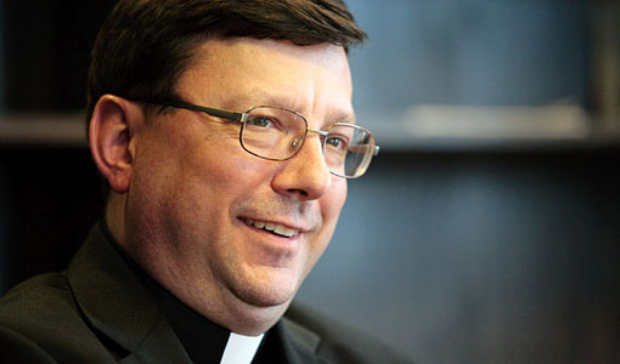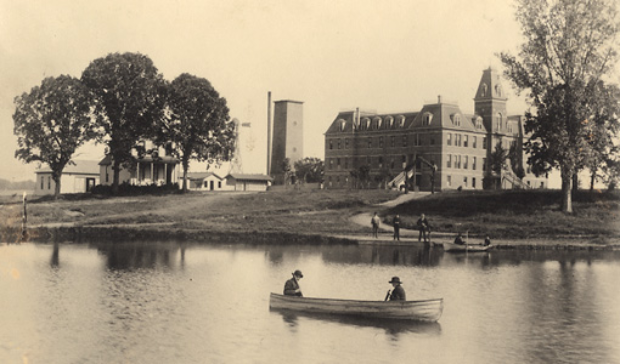Father Lee Piche pursued a doctorate in philosophy at Columbia University in New York on and off for a decade. He had been a visiting scholar at Princeton University and had taught at St. Thomas, his alma mater, for several years, and he long thought his career was destined to be in the classroom.
While in New York, he assisted at a parish and decided that life – as a parish priest – “was my true calling.”When he got a call from Archbishop Harry Flynn with an offer to become a pastor, he came home in 1999 – first to St. Joseph’s in West St. Paul and then to All Saints in Lakeville.
So when new Archbishop John Nienstedt met with Piche last spring and asked him to consider the positions of moderator of the curia and vicar general of the Archdiocese of St. Paul and Minneapolis, Piche found himself with another conundrum.
“There was no undue pressure or arm twisting,” he said. “The archbishop wanted this to be a free and happy decision on my part. But it was difficult because it meant stepping away from parish ministry again, and I dearly loved that.”
He also remembered an incident involving Father Kevin McDonough, who served as vicar general for 17 years until last June. McDonough was at St. Joseph’s for a Mass and Piche saw him sifting through a stack of phone messages. “I thought, ‘Boy, I pity the guy who is going to get his job when he moves on to a new assignment.’”
Well, Piche became that guy. He took the job – essentially, it is the No. 2 position in the archdiocese – because he came to a better understanding of his role.
“I’m still a pastoral person,” he said, but with a broader perspective “of working with all of the priests, parish councils, church leaders, trustees and others.” As moderator of the curia, he is chief of the archdiocese’s central staff. As vicar general, he is the archbishop’s representative and similar in many respects to any pastor who is the vicar of his own parish. He also serves as pastor of St. Andrew’s in St. Paul.
“It has been challenging and fast-paced – and especially challenging for multi-tasking,” he said. “The degree of responsibility and authority is very demanding. People are looking to me for decisions that affect their parishes.” He also found the archbishop’s absence for summer trips to Rome, Germany and Australia both “terrifying” and helpful “because I could feel my way into the job.”
“The aspect of this ministry that is most exciting is being able to assist the archbishop – to advise, to carry out his objectives and to understand his vision as the chief shepherd of the archdiocese,” he said. “The things I’m learning and the people I’m meeting are fascinating – I never would have dreamed, for example, that I’d be on the Board of Trustees at St. Thomas.”
"I think I’m a good listener, and maybe that I don’t know all of the answers is a plus because I won’t make snap judgments"
Piche finds the greatest – and the most vexing – challenges have to do with what he calls “the unrelenting demands to solve problems.” He jokes that he comes into the office thinking not “whether there’s going to be a crisis today, but what will be today’s crisis.” Often those crises involve the need to deal with people’s anger and frustration.“People are looking for someone who will listen to them and understand where they are coming from,” Piche said. “I think I’m a good listener, and maybe that I don’t know all of the answers is a plus because I won’t make snap judgments.”
Piche learned how to be a good listener as the oldest of seven children born to a banker and a homemaker. The family moved from Minneapolis to New Brighton in the mid-1960s and Piche graduated from Irondale High School in 1976. He enrolled at St. Thomas that fall – a year before, he noted with a wink, “St. Thomas went coed and I had my first vocational crisis.”
Actually, he had thought of the priesthood since he was six or seven years old, and throughout high school and college he was intrigued by the liturgy and a priest’s role.
“I knew I wouldn’t be happy just making money,” he said. “I wanted to help people and to prepare them for eternal life.” At the same time, becoming a priest concerned him because “I knew it would be difficult to give up the idea of family life, having grownup in such a large family.”
After graduating from St. Thomas in 1980, Piche entered the St. Paul Seminary. Each spring, he said, he got tired and his confidence waned, “and I questioned if I was really able to do this (the priesthood). Then I would go to ordination at the Cathedral and I’d think, ‘I’ll give it another year.’ Their example inspired me.”
He was ordained in 1984 and spent three years at St. Mark’s Catholic Church in St. Paul. He was assigned to the philosophy faculty at St. Thomas in 1987 with the understanding that he would immediately begin his doctoral studies. He spent a year at Princeton, which he called “a phenomenal experience – sitting in on lectures of world-renowned scholars, and I didn’t know what they were talking about!” His Columbia experience, interspersed by teaching philosophy at St. Thomas from 1994 to 1997, convinced him that a college classroom was not his calling.
“He always wanted to be a parish priest,” said Dr. Thomas Sullivan, who has taught philosophy at St. Thomas since 1966 and remembers Piche as a student and a faculty colleague. “He wasn’t ‘on fire’ to be a university professor.”
It is too early, obviously, for Piche to even think about next steps, and he insists he has no ambitions to hold higher office. He simply wants to direct his energy both to his new assignment “and, most of all, to being a good priest until I’m called by the Lord.”
He recalls how a homilist once told about a visit with a dying priest, and asking him for what he should pray.“His response,” Piche said, “was, ‘Just pray that I will be faithful.’ That still moves me when I think of it, and it’s what I want, too.”
Father Lee Piche and St. Thomas
- Joined the Board of Trustees in 2008 and serves on the Academic Affairs Committee.
- Graduated in 1980 with a degree in philosophy, and loved his language courses. One semester, he took Greek, French and German classes and tutored Latin students. He taught philosophy from 1994 to 1997.
- Is delighted to be back on campus as a trustee: "It's like coming home. There is enough of an element of newness - more faculty, students, buildings - that brings excitement."
- Sees a challenge in maintaining a focus on the university's Catholic mission. He acknowledges a greater diversity of thinking within the church today and how "I'm not sure everybody agrees what 'Catholic' means today."







